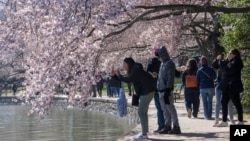Thousands of Japanese cherry trees are blooming on the National Mall in Washington, D.C. When the trees reach peak bloom, the United States’ capital city is awash in pink and white.
In the 1920s, the average peak bloom date was April 5. That moved up to March 31 in recent years. And the 2023 peak arrived yet a week earlier, the National Park Service said last week.
“I’m feeling like this is going to be the trend” because of climate change, said Matthew Morrison. He is the park service’s urban forester charged with overseeing the trees’ care.
The yearly National Cherry Blossom Festival will run through April 16 this year. It celebrates Japan’s 1912 gift of 3,020 cherry trees to the city of Washington.
Two of those trees were planted by First Lady Helen Herron Taft and Viscountess Chinda, wife of the Japanese Ambassador to the United States, with just a few onlookers present.
The average life of a Japanese cherry tree is between 30 and 40 years. Yet the two trees planted by Taft and Chinda and several others are still standing 111 years later.
“That defies science,” said Morrison. He credited the tree’s long life to “a little bit of magic” and the year-round care his team provides.
Many of the 3,700 trees blooming at the park today come from cuttings from the first trees, Morrison said. Others are regularly donated by the Casey Trees group of Washington.
Morrison oversees a team of just three arborists. They are charged with caring for the cherry trees and keeping a “personal health record” for each.
Three years ago, Morrison introduced the practice of mulching trees with large amounts of wood chips to help their growth. As the chips break down, he said, they release fungi and bacteria to help the tree’s roots.
The wood chips also serve as a barrier between the grass and the trees. This prevents accidental cuts caused by lawn equipment.
Morrison suggests the same practice for homeowners growing trees in their own yards. When wood chips are applied over the root areas, he said, “it would never need any fertilizer, amendments” or more water.
“Even on the hottest days of summer when it hasn’t rained, I dig down in the wood chips and find moisture,” he said.
Morrison said most of the National Mall’s cherry blossom trees are Yoshino. “It’s one of the best growers and the best to flower,” he said. “Kwanzan cherry also is a good grower and gets a little bigger than Yoshino.”
As for the National Cherry Blossom Festival, there are still several events throughout Washington and its suburbs. They include a Japanese street festival, running events, fireworks, and food festivals. If you cannot make it, there is a Bloom Cam to look at the cherry blossoms.
I’m Caty Weaver.
Jessica Damiano reported this story for the Associated Press. Hai Do adapted it for VOA Learning English.
__________________________________________________________________
Words in This Story
peak bloom –n. the time when cherry blossoms are at their best
trend –n. the general direction of change for a behavior, activity or development
defy –v. to refuse to obey;
magic –n. power that lets people do impossible things
arborist –n. a person who cares for and knows about trees
fungi –n. (pl.) a group of living things that are not plants or animals
moisture –n. a small amount of liquid that makes something wet






Forum